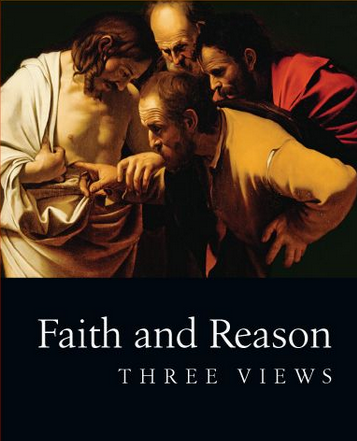 Philosophy is rooted in reason and begins with detachment and skepticism. Theology is rooted in revelation and begins with faith and trust. History has assigned the former to the public realm, especially in the form of science, and the second to the private realm. Are the two allies? Are they competitors? Such are the questions asked in IVP’s newest Spectrum Multiview Books, this one edited by Azusa Pacific professor, Steven Wilkens, and called Faith and Reason: Three Views.
Philosophy is rooted in reason and begins with detachment and skepticism. Theology is rooted in revelation and begins with faith and trust. History has assigned the former to the public realm, especially in the form of science, and the second to the private realm. Are the two allies? Are they competitors? Such are the questions asked in IVP’s newest Spectrum Multiview Books, this one edited by Azusa Pacific professor, Steven Wilkens, and called Faith and Reason: Three Views.
The three views are Faith and Philosophy in Tension, by Carl A. Raschke; the second is Faith Seeking Understanding, by Alan G. Padgett; and the third is the Synthesis of Reason and Faith, by Craig A. Boyd. An admirable introduction sets up the conversation.
This conversation is very important for the science and faith debate, for the history and the Bible debate, and for theology in general. I am surprised how often this basic issue — the relationship of faith and reason — emerges. Take one’s political postures: there are plenty who think their political or public view is that of the US Constitution while their personal, private view is based on the Bible or the Christian tradition. I think every Democrat and Republican president since Carter — I could be wrong — has said at least once in their career, “My private view of abortion is that I’m against it, but Roe v. Wade is law and I will abide by it as a public servant.” Faith and reason, personal view vs. public view… I see these political postures as connected to the faith and reason debate because “reason” is often seen negotiating a viewpoint in the public sector on the basis of evidence.
Take historians and theologians, and make the second group creedalists. Yes, as a historian a Christian might say “I can’t prove the deity of Christ” but in church on Sunday “I confess it.” Reason and faith, reason or faith? These three views will each have something to say about each of these issues though the book’s authors aren’t discussing these topics.
But Steve Wilkens, in his introductory essay, asks if we have to make them binaries — either/or. Some see faith as superstition and some see science as human arrogance contrary to the revealed will of God. Most thinkers today do not operate with these as binary opposites but seek some kind of synthesis. Everyone, in fact, operates on the basis of reason, and everyone has a faith that shapes how and where that reason comes into play. So the issue is the relationship of faith and reason, not the alternative of faith or reason.
A sketch of each then:
Faith and Philosophy in Tension. Tertullian: “What indeed has Athens to do with Jerusalem?” Or the even more colorful Luther: “Reason is the devil’s prostitute…. Reason is the greatest enemy that faith has.” But, nuanced just a bit, both of these theologians were philosophical reasoners. They were not “anti-intellectual fideists” (13). Some in the Tension camp emphasize the ontological distance between Creator and created and the need for revelation to know what Creator wants created to understand. Reason is fine for the mundane matters of the world. God’s actions however may appear to be wholly irrational. Others will emphasize the spiritual distance. General revelation then is diminished because humans are mentally corrupted. Thus, via negativa and apophatic theology emphasize ontological distance: or love as the true path of knowing. He points to JKA Smith, Nicolas of Cusa, Blaise Pascal, and Kierkegaard, as well as the Formula of Concord and some forms of Anabaptism.
Faith Seeking Understanding. Reason’s corruption results in the fact that reason cannot save us; furthermore, volition of the will plays a significant part in this discussion. FSU folks think salvation restores reason and will so that they can be of use to the believer. The main example here is Augustine, then Anselm and Calvin. Augustine: “Therefore, seek not to understand so that you may believe, but believe so that you might understand; for ‘unless you believe, you will not understand’.” Once one believes the mind is set loose to explore what the faith is. One finds a logic that transcends the power of reason alone (23).
[One ought to see why for many someone’s intellectual commitment or “position” is seen as a lack of faith. That is, one hears this: “If that person were fully open to the whole counsel of God that person would not come to such and such a position.” Thus, it is seen as a spiritual problem.]
The Synthesis view is a matter of degree of how much reason is permitted. Redemption brings into clarity what reason only barely knows. St Thomas Aquinas is the model so this is the Thomistic Synthesis view. “… the TS argues that the degree of truth and beauty available to reason’s natural powers is like a signpost that can point us in the direction of salvation and the deeper spiritual truths available through special revelation” (27). [Is classical or populist evangelical apologetics a Thomistic Synthesis at work?] Natural reason is a handmaiden to theology and faith. Natural theology has higher value. Clement of Alexandria, Justin Martyr … Paul in Romans 1:20 … but the Platonism of Augustine shifted to the Aristotelian approach in Aquinas, from the a priori to the a posteriori, from faith seeking understanding to understanding leading to faith [my expression, not Steve’s]. Theology has a priority over philosophy.











